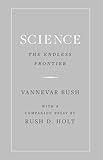Science, the endless frontier
Material type: TextPublication details: New Jersey : Princeton University Press, ©2021Description: 171 p. ; 18 cmISBN:
TextPublication details: New Jersey : Princeton University Press, ©2021Description: 171 p. ; 18 cmISBN: - 9780691186627
- 338.973 23 BUS-S
- Q127.U6 B88 2021
| Item type | Current library | Collection | Call number | Status | Date due | Barcode | Item holds |
|---|---|---|---|---|---|---|---|
 Books
Books
|
IIITD General Stacks | Social Science | 338.973 BUS-S (Browse shelf(Opens below)) | Available | 010524 |
Includes bibliographical references.
"In 1945, the director of the U.S. Office of Scientific Research and Development, Vannevar Bush, issued the now-famous report entitled Science, the Endless Frontier. Commissioned by President Roosevelt in late 1944, as World War II was winding down, the report made a forceful case for the continuing importance of government support of the sciences in peacetime. Bush argued that scientific progress was essential to the health, security, and prosperity of the nation, and as such was a vital responsibility of the government to promote. Among his major recommendations were the funding of basic research at colleges and universities without expectation of immediate military or industrial application; increased access to higher education for talented students of all economic backgrounds, especially through scholarships; and the establishment of an independent science agency to administer it all. Bush's vision set the course for United States science policy over the next half century and was in large part responsible for the great boom in public funding of basic research after World War II. It remains a touchstone for many today as a passionate articulation of the power and potential of science and its essential role in society. This short volume reproduces Bush's report alongside an original companion essay by Rush D. Holt, offering some historical background and reflecting on the report's legacy and continuing relevance, as well as its limitations. Holt's argument is that today's challenges require a more capacious understanding of science's value to society than Bush articulated: as not only a source of practical benefit, but an empirically based approach to understanding the world that is ultimately fundamental to democracy. Holt's essay closes by issuing a renewed call to science-for scientists, policymakers, and citizens alike"--


There are no comments on this title.